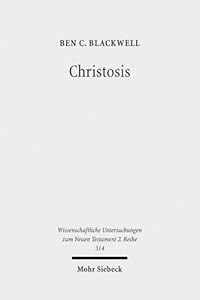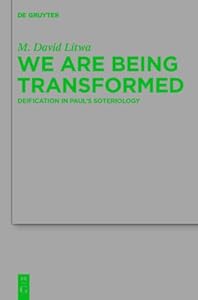 As I was entering the Judaism and Christianity in Antiquity program at the University of Virginia, I was told another entering student would be working on theosis or deification in Paul, and I thought, "That's weird." I hope I can be forgiven such a dismissive reaction, since my interest in Paul at the time was mostly to do with the so-called apocalyptic Paul. In Joseph Kitagawa's foreword to Peter Brown's Haskell Lectures (The Cult of the Saints), he observes, "A number of graduate students remarked to me that at the beginning of the five lectures, they had no interest in the cult of the saints at all; by their conclusion, they had more interest in that subject than in their own area of research!" (x). I have occasionally felt the same about the work of my colleague at UVa, David Litwa. I have already mentioned that his book, We Are Being Transformed: Deification in Paul's Soteriology (BZNW 187; Goettingen: de Gruyter), came out earlier this year. His intensity and tenacity in exploring the theme of deification in the ancient world and Paul is contagious. As it turns out, though, David has not been the only one thinking along such lines. Ben Blackwell's revised Durham dissertation, Christosis (WUNT II, vol. 314; Tuebingen: Mohr Siebeck, 2011) also takes up the theme. Indeed, there have been a few hints toward the question by Michael Gorman and Stephen Finlan, but these two volumes by Blackwell and Litwa represent the first two detailed discussions of theosis/deification as a Pauline soteriological model. One could not ask for more different approaches. Blackwell suggests that there are two open paths for investigating the theme of theosis in Paul: one can approach the subject either through history of religions or through history of interpretation. Surely there are other approaches as well, but this simple schema highlights precisely the difference between Litwa and Blackwell. In this post, and in one or two following, I will be reviewing Blackwell and Litwa, and I will offer some concluding thoughts. Those who know my online style know that I can come off as hyper-critical. To my mind, one of the highest compliments one can pay to an author is sharp criticism. I trust that those under review will so take the following remarks.
As I was entering the Judaism and Christianity in Antiquity program at the University of Virginia, I was told another entering student would be working on theosis or deification in Paul, and I thought, "That's weird." I hope I can be forgiven such a dismissive reaction, since my interest in Paul at the time was mostly to do with the so-called apocalyptic Paul. In Joseph Kitagawa's foreword to Peter Brown's Haskell Lectures (The Cult of the Saints), he observes, "A number of graduate students remarked to me that at the beginning of the five lectures, they had no interest in the cult of the saints at all; by their conclusion, they had more interest in that subject than in their own area of research!" (x). I have occasionally felt the same about the work of my colleague at UVa, David Litwa. I have already mentioned that his book, We Are Being Transformed: Deification in Paul's Soteriology (BZNW 187; Goettingen: de Gruyter), came out earlier this year. His intensity and tenacity in exploring the theme of deification in the ancient world and Paul is contagious. As it turns out, though, David has not been the only one thinking along such lines. Ben Blackwell's revised Durham dissertation, Christosis (WUNT II, vol. 314; Tuebingen: Mohr Siebeck, 2011) also takes up the theme. Indeed, there have been a few hints toward the question by Michael Gorman and Stephen Finlan, but these two volumes by Blackwell and Litwa represent the first two detailed discussions of theosis/deification as a Pauline soteriological model. One could not ask for more different approaches. Blackwell suggests that there are two open paths for investigating the theme of theosis in Paul: one can approach the subject either through history of religions or through history of interpretation. Surely there are other approaches as well, but this simple schema highlights precisely the difference between Litwa and Blackwell. In this post, and in one or two following, I will be reviewing Blackwell and Litwa, and I will offer some concluding thoughts. Those who know my online style know that I can come off as hyper-critical. To my mind, one of the highest compliments one can pay to an author is sharp criticism. I trust that those under review will so take the following remarks.Friday, July 13, 2012
Pauline Soteriology: Theosis or Deification (Part I: Ben Blackwell)
 As I was entering the Judaism and Christianity in Antiquity program at the University of Virginia, I was told another entering student would be working on theosis or deification in Paul, and I thought, "That's weird." I hope I can be forgiven such a dismissive reaction, since my interest in Paul at the time was mostly to do with the so-called apocalyptic Paul. In Joseph Kitagawa's foreword to Peter Brown's Haskell Lectures (The Cult of the Saints), he observes, "A number of graduate students remarked to me that at the beginning of the five lectures, they had no interest in the cult of the saints at all; by their conclusion, they had more interest in that subject than in their own area of research!" (x). I have occasionally felt the same about the work of my colleague at UVa, David Litwa. I have already mentioned that his book, We Are Being Transformed: Deification in Paul's Soteriology (BZNW 187; Goettingen: de Gruyter), came out earlier this year. His intensity and tenacity in exploring the theme of deification in the ancient world and Paul is contagious. As it turns out, though, David has not been the only one thinking along such lines. Ben Blackwell's revised Durham dissertation, Christosis (WUNT II, vol. 314; Tuebingen: Mohr Siebeck, 2011) also takes up the theme. Indeed, there have been a few hints toward the question by Michael Gorman and Stephen Finlan, but these two volumes by Blackwell and Litwa represent the first two detailed discussions of theosis/deification as a Pauline soteriological model. One could not ask for more different approaches. Blackwell suggests that there are two open paths for investigating the theme of theosis in Paul: one can approach the subject either through history of religions or through history of interpretation. Surely there are other approaches as well, but this simple schema highlights precisely the difference between Litwa and Blackwell. In this post, and in one or two following, I will be reviewing Blackwell and Litwa, and I will offer some concluding thoughts. Those who know my online style know that I can come off as hyper-critical. To my mind, one of the highest compliments one can pay to an author is sharp criticism. I trust that those under review will so take the following remarks.
As I was entering the Judaism and Christianity in Antiquity program at the University of Virginia, I was told another entering student would be working on theosis or deification in Paul, and I thought, "That's weird." I hope I can be forgiven such a dismissive reaction, since my interest in Paul at the time was mostly to do with the so-called apocalyptic Paul. In Joseph Kitagawa's foreword to Peter Brown's Haskell Lectures (The Cult of the Saints), he observes, "A number of graduate students remarked to me that at the beginning of the five lectures, they had no interest in the cult of the saints at all; by their conclusion, they had more interest in that subject than in their own area of research!" (x). I have occasionally felt the same about the work of my colleague at UVa, David Litwa. I have already mentioned that his book, We Are Being Transformed: Deification in Paul's Soteriology (BZNW 187; Goettingen: de Gruyter), came out earlier this year. His intensity and tenacity in exploring the theme of deification in the ancient world and Paul is contagious. As it turns out, though, David has not been the only one thinking along such lines. Ben Blackwell's revised Durham dissertation, Christosis (WUNT II, vol. 314; Tuebingen: Mohr Siebeck, 2011) also takes up the theme. Indeed, there have been a few hints toward the question by Michael Gorman and Stephen Finlan, but these two volumes by Blackwell and Litwa represent the first two detailed discussions of theosis/deification as a Pauline soteriological model. One could not ask for more different approaches. Blackwell suggests that there are two open paths for investigating the theme of theosis in Paul: one can approach the subject either through history of religions or through history of interpretation. Surely there are other approaches as well, but this simple schema highlights precisely the difference between Litwa and Blackwell. In this post, and in one or two following, I will be reviewing Blackwell and Litwa, and I will offer some concluding thoughts. Those who know my online style know that I can come off as hyper-critical. To my mind, one of the highest compliments one can pay to an author is sharp criticism. I trust that those under review will so take the following remarks.Thursday, April 26, 2012
David Litwa on Deification in Paul
A belated congratulations to my friend and colleague, David Litwa on the publication of his book. I read parts while it was in progress, and it is a very learned volume. Litwa's approach is certainly more historical than most approaches to deification, but precisely therein lies its value. If you are interested in Paul, I recommend you read it. I will try to post a review in the near future.
Tuesday, January 31, 2012
De Lubac on Platonism and Stoicism in the Bible and the Fathers
"It is a commonplace to allude to the Platonism of the Fathers in connexion with these doctrines [of the cosmic body]. But instead of invoking the Platonic doctrine of essential being, we should do better to account for them--to the extent that they are dependent at all on a philosophic basis--by looking rather to the Stoic conception of universal being. There are many expressions in Marcus Aurelius, for example, regarding the integration of the individual in the concrete totality of the cosmos, and still more concerning the reciprocal immanence of those who are participators in the Nous. But all this is of secondary importance, and we should beware of adopting the practice known in accountancy as double-entry, as so many Protestant historians do in dealing with the Fathers and the Bible. For in the Fathers they will see nothing but Hellenistic borrowings and influence, whereas in St. Paul and St. John they will find nothing but 'pure revelation' or at least 'pure religion.' So severely critical an attitude on the one hand, such naive simplicity on the other, are in fact equally the causes of their blindness.
"For in whatever degree a philosophical basis was necessary to the Fathers, were it Platonist or Stoic, their speculation was conditioned less by considerations of philosophy than by a keen realization of the needs of Christianity. How else indeed could they make the most of the metaphor of the body and its members in the great Pauline epistles if they were to leave Stoicism out of account? Or how could they interpret with accuracy the epistle to the Hebrews if first they must eliminate all trace of Platonism? In fact, they never scrupled to borrow, and that to a large extent, from the great pagan philosophers whom they held in esteem. But, wiser than Solomon, they were not led into idolatry by their philosophy, and as a modern historian, Christopher Dawson, has remarked, we must go back to St. John and St. Paul if we would understand patristic thought."
--Henri de Lubac, Catholicism (transl. Lancelot Sheppard; New York: Sheed and Ward, 1958) 9-10. (Pages 40-1 in Ignatius Press version pictured above.)
Subscribe to:
Comments (Atom)

